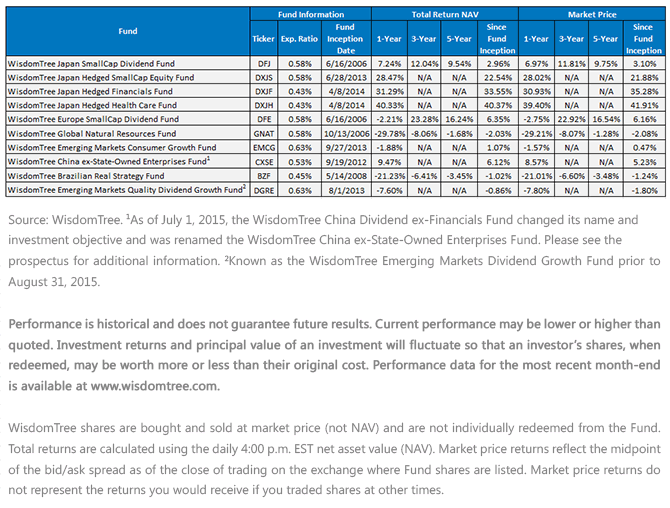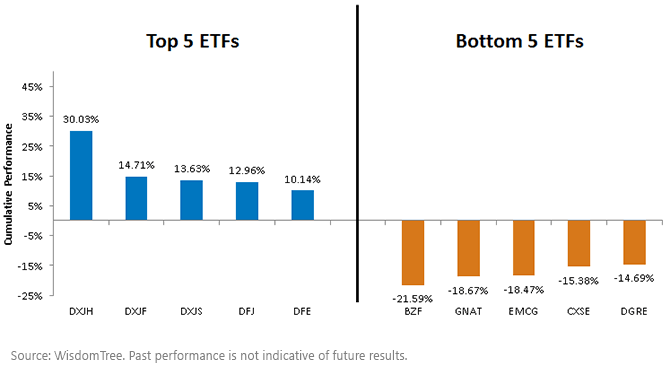WisdomTree’s Best and Worst Performing ETFs This Year


 WisdomTree’s Top Five and Bottom Five ETFs (12/31/2014–8/31/2015)
WisdomTree’s Top Five and Bottom Five ETFs (12/31/2014–8/31/2015)
 The Top Five ETFs- What We're Watching
Within Japan, one key item to watch is the potential for further action from the BOJ. Additionally, it is important to note that the general themes for the Health Care sector (for DXJH) have been strong profit performance and the potential for a favorable regulatory environment from the government that encourages some of the latest health care research to be centered in Japan. DXJF, although challenged during the month of August, is still interesting, in our opinion, because the Financials sector is coming in focus as investors prepare for the initial public offering of Japan Post1—expected in November—which will be the largest privatization in Japan in about three decades.2 Expectations are that Japan Post could offer a compelling dividend to attract investors and thus put pressure on banks to also raise their dividends. Small-cap stocks in both Europe and Japan have the potential to be less sensitive to global macroeconomic concerns, such as a slowing Chinese economy, as they tend to be less focused on exports.
The Bottom Five ETF- What We're Watching
The first eight months of 2015 have been characterized by a strengthening U.S. dollar—especially against the currencies of markets known for significant commodity exports. BZF has been a direct representation of this trend, but GNAT, EMCG and DGRE have been hit with their exposures to emerging market currencies as well. CXSE tracks the performance of an Index that we think is a very interesting way to look at China—as most of the largest companies there have significant state ownership—but with Chinese equities broadly out of favor of late, it has been facing a challenging environment.
For those who believe the commodities rout is coming to an end and that emerging market currencies are getting close to the end of their weakness against the U.S. dollar, these bottom five may offer a list to focus on, while those looking to participate in continuing momentum may want to focus on various elements in Japan and Europe.
1Japan Post, a government-owned mail monopoly until 2007, is a post, logistics and courier service headquartered in Tokyo.
2Source: Takaya Yamaguchi, “Exclusive: Japan Post’s $11 Billion Triple Listing Expected November 4 – Sources,” Reuters, 8/14/15.
The Top Five ETFs- What We're Watching
Within Japan, one key item to watch is the potential for further action from the BOJ. Additionally, it is important to note that the general themes for the Health Care sector (for DXJH) have been strong profit performance and the potential for a favorable regulatory environment from the government that encourages some of the latest health care research to be centered in Japan. DXJF, although challenged during the month of August, is still interesting, in our opinion, because the Financials sector is coming in focus as investors prepare for the initial public offering of Japan Post1—expected in November—which will be the largest privatization in Japan in about three decades.2 Expectations are that Japan Post could offer a compelling dividend to attract investors and thus put pressure on banks to also raise their dividends. Small-cap stocks in both Europe and Japan have the potential to be less sensitive to global macroeconomic concerns, such as a slowing Chinese economy, as they tend to be less focused on exports.
The Bottom Five ETF- What We're Watching
The first eight months of 2015 have been characterized by a strengthening U.S. dollar—especially against the currencies of markets known for significant commodity exports. BZF has been a direct representation of this trend, but GNAT, EMCG and DGRE have been hit with their exposures to emerging market currencies as well. CXSE tracks the performance of an Index that we think is a very interesting way to look at China—as most of the largest companies there have significant state ownership—but with Chinese equities broadly out of favor of late, it has been facing a challenging environment.
For those who believe the commodities rout is coming to an end and that emerging market currencies are getting close to the end of their weakness against the U.S. dollar, these bottom five may offer a list to focus on, while those looking to participate in continuing momentum may want to focus on various elements in Japan and Europe.
1Japan Post, a government-owned mail monopoly until 2007, is a post, logistics and courier service headquartered in Tokyo.
2Source: Takaya Yamaguchi, “Exclusive: Japan Post’s $11 Billion Triple Listing Expected November 4 – Sources,” Reuters, 8/14/15.
Important Risks Related to this Article
High double-digit returns are highly unusual and cannot be sustained. Investors should also be aware that these returns were achieved primarily during favorable market conditions. A Fund’s performance, especially for very short periods, should not be the sole factor in making an investment decision. Dividends are not guaranteed, and a company’s future ability to pay dividends may be limited. A company currently paying dividends may cease paying dividends at any time.
There are risks associated with investing, including possible loss of principal. Foreign investing involves special risks, such as risk of loss from currency fluctuation or political or economic uncertainty. Investments in currency involve additional special risks, such as credit risk and interest rate fluctuations.
Funds focusing on a single sector generally experience greater price volatility. Investments in emerging, offshore or frontier markets are generally less liquid and less efficient than investments in developed markets and are subject to additional risks, such as risks of adverse governmental regulation and intervention or political developments. Investments in commodities may be affected by overall market movements, changes in interest rates and other factors such as weather, disease, embargoes and international economic and political developments. An investment in commodities may not be suitable for all investors.
Derivative investments can be volatile, and these investments may be less liquid than other securities, and more sensitive to the effect of varied economic conditions. As these Funds can have a high concentration in some issuers, the Funds can be adversely impacted by changes affecting those issuers. Due to the investment strategy of these Funds, they may make higher capital gain distributions than other ETFs. Please read the Funds’ prospectuses for specific details regarding the Funds’ risk profiles.
Hedging can help returns when a foreign currency depreciates against the U.S. dollar, but can hurt when the foreign currency appreciates against the U.S. dollar.

Christopher Gannatti began at WisdomTree as a Research Analyst in December 2010, working directly with Jeremy Schwartz, CFA®, Director of Research. In January of 2014, he was promoted to Associate Director of Research where he was responsible to lead different groups of analysts and strategists within the broader Research team at WisdomTree. In February of 2018, Christopher was promoted to Head of Research, Europe, where he was based out of WisdomTree’s London office and was responsible for the full WisdomTree research effort within the European market, as well as supporting the UCITs platform globally. In November 2021, Christopher was promoted to Global Head of Research, now responsible for numerous communications on investment strategy globally, particularly in the thematic equity space. Christopher came to WisdomTree from Lord Abbett, where he worked for four and a half years as a Regional Consultant. He received his MBA in Quantitative Finance, Accounting, and Economics from NYU’s Stern School of Business in 2010, and he received his bachelor’s degree from Colgate University in Economics in 2006. Christopher is a holder of the Chartered Financial Analyst Designation.

